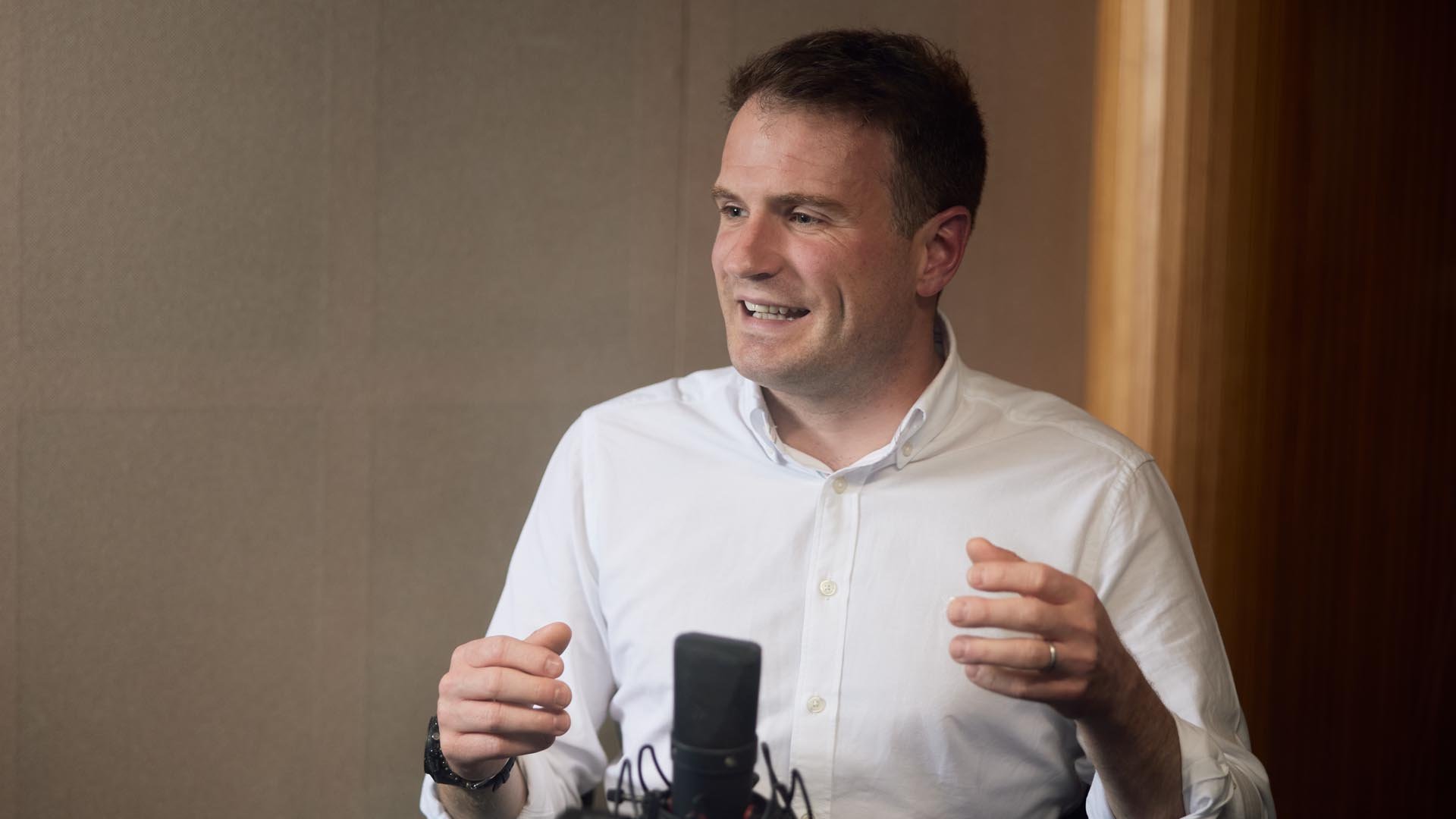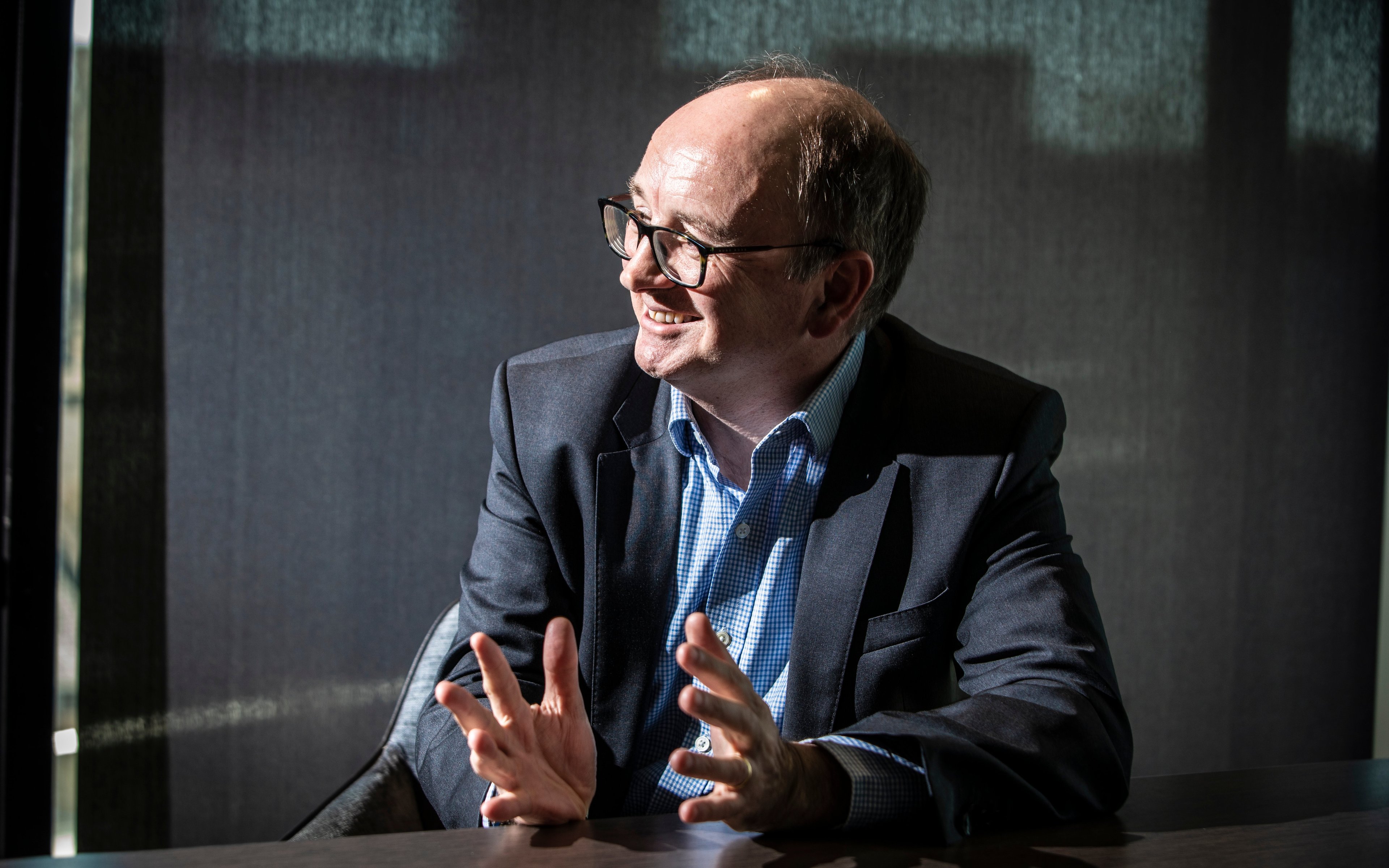Key points
- Our Japan Team seeks out companies critical to transforming business and society
- They include digitalisation, automation, the rising wealth of Japan’s neighbours and the healthcare needs of an ageing population
- Shares in Japanese growth companies are often more attractively priced than their western counterparts
Listen to the podcast on Spotify and Apple Podcasts
Your capital may be at risk
A frequent visitor to Japan, Matthew Brett has noticed a change since pandemic-era travel restrictions relaxed.
“There’s been a complete shift in mindset when it comes to money,” the investment manager tells our Short Briefings on Long Term Thinking podcast.
“It used to be the case that you’d be daft to go to Japan without a big pile of cash. But in recent trips, I’ve come across card-only restaurants, which would be unbelievable even a few years ago. I’ve even come across a convenience store that would only take cards.”
Japan used to be “a laggard” in terms of ditching coins and notes, he adds, but an appreciation that “electronic money is just a lot cleaner” appears to have given the country the nudge it needed.
The phenomenon is evidence of Japan’s broader embrace of ‘digitalisation’ – a shift from paper-based systems to digitised data accessed via software and the internet. And it’s one of four structural growth trends that Bailie Gifford’s Japan Team identified in its paper Japan: the next opportunity as having the potential to drive outperformance over the years ahead.

Rakuten Pay provides shops with an easy way to accept digital payments and benefits shoppers by rewarding them with loyalty points
Brett gives Rakuten as one example of a business in digitisation’s vanguard. The firm’s activities range from online credit cards and in-store QR-barcode-based payment systems to mobile connectivity, as well as internet-based travel bookings, shopping, TV and stock brokerage services. A loyalty rewards scheme links the services together.
“If someone uses more than one service, the discounts add up and multiply together,” Brett explains. “And because Rakuten evolved most of these services internally, they all use the same ID. So it's really easy for a customer who signed up to the Rakuten Bank, for example, to become a customer of Rakuten Mobile because most of the needed information is already present.”
Robotic vision
Accelerating automation is a second example of a transformational force creating a growth opportunity. Japan produces 46 per cent of all industrial robots, according to the International Federation of Robotics. However, Brett thinks we are still “at the bottom of the foothills of the opportunity” that the sector presents.
“The problem with robots right now is, to be frank, they're a bit thick,” he explains. “They don’t always know where they are and that makes them very dangerous. But if you develop machine vision and the robot has awareness of what is around it, then you can get ‘cobots’, where the robot can be packing boxes alongside a human. And if there’s contact between the robot and the human, well, as long as the robot stops moving quickly, it’s OK.”

Keyence’s vision sensors are widely used by automakers to check they have correctly inserted screws, among other tasks
Keyence is one example of a company driving progress in this field. It makes machine vision sensors with built-in artificial intelligence that can spot one faulty screw among thousands and inadequately sealed food packaging. Fanuc is another. It creates robots designed to work in close proximity to humans in factories making automobiles, pharmaceuticals and electronics, among other products.
The rising wealth of Japan’s Asian neighbours is the third growth driver. The continent is home to about five billion people, many of whom have growing discretionary spending power.
“Within the region, Japan is the most developed country and therefore has things other people desire,” Brett says. He points to skincare brands KOSÉ and Shiseido as being two portfolio companies poised for long-term growth thanks in large part to their heritage.
“There are some areas of life where people can create new brands relatively quickly,” he says. “Skincare tends not to be one of those areas. It is difficult. People have great loyalty to brands in a way that they don't to other types of products.”
Alzheimer’s and ageing
Meeting the elderly’s unmet healthcare needs is the fourth structural growth driver. Japan famously has the world’s oldest population – more than one in 10 of its inhabitants is over 80 and almost a third of its population is over 65. Brett notes, however, the opportunity extends beyond its own borders.
His team recently took a stake in Tokyo-based Eisai, maker of the Alzheimer’s drug Leqembi. The disease and other forms of dementia are the UK’s leading cause of death.
“Leqembi is the first drug to market which can slow the progression of Alzheimer’s,” Brett says. “It can help people once they've developed symptoms. But what’s interesting is it appears that the drug, over time, clears some of the amyloid plaques [linked to Alzheimer’s] from the brain. That raises a really interesting question: could you start the treatment earlier? Eisai’s got a trial going on at the moment looking at that.”
Japanese growth companies haven’t historically attained the scale of some of their western counterparts. However, Brett suggests that only adds to the appeal of finding and backing those capitalising on change.
“Japan has well over 1,500 listed companies,” he says, “and when I looked recently, the US chipmaker NIVIDA as a single firm was worth roughly three-quarters the value of the entire Japanese market.
“From the perspective of opportunity, that suggests that if you find a company in Japan that can grow its earnings over time, you’re unlikely to pay a super-high price. And that’s exciting as a long-term patient growth investor.”
Hear more of Matthew’s thoughts, including his take on snack maker Calbee’s approach to innovation, by subscribing to Short Briefings on Long Term Thinking on Spotify, Apple Podcasts or any other podcast app.
Read more about the growth drivers Japanese companies are seizing on in our paper, Japan: the next opportunity.
Words by Leo Kelion

Risk factors
The views expressed should not be considered as advice or a recommendation to buy, sell or hold a particular investment. They reflect opinion and should not be taken as statements of fact nor should any reliance be placed on them when making investment decisions.
This communication was produced and approved in July 2024 and has not been updated subsequently. It represents views held at the time of writing and may not reflect current thinking.
Investing in private companies could increase risk as these assets may be more difficult to sell, so changes in their prices may be greater.
Potential for profit and loss
All investment strategies have the potential for profit and loss, your or your clients’ capital may be at risk. Past performance is not a guide to future returns.
This communication contains information on investments which does not constitute independent research. Accordingly, it is not subject to the protections afforded to independent research, but is classified as advertising under Art 68 of the Financial Services Act (‘FinSA’) and Baillie Gifford and its staff may have dealt in the investments concerned.
All information is sourced from Baillie Gifford & Co and is current unless otherwise stated.
The images used in this communication are for illustrative purposes only.
Important Information
Baillie Gifford & Co and Baillie Gifford & Co Limited are authorised and regulated by the Financial Conduct Authority (FCA). Baillie Gifford & Co Limited is an Authorised Corporate Director of OEICs.
Baillie Gifford Overseas Limited provides investment management and advisory services to non-UK Professional/Institutional clients only. Baillie Gifford Overseas Limited is wholly owned by Baillie Gifford & Co. Baillie Gifford & Co and Baillie Gifford Overseas Limited are authorised and regulated by the FCA in the UK.
Persons resident or domiciled outside the UK should consult with their professional advisers as to whether they require any governmental or other consents in order to enable them to invest, and with their tax advisers for advice relevant to their own particular circumstances.
Financial Intermediaries
This communication is suitable for use of financial intermediaries. Financial intermediaries are solely responsible for any further distribution and Baillie Gifford takes no responsibility for the reliance on this document by any other person who did not receive this document directly from Baillie Gifford.
Europe
Baillie Gifford Investment Management (Europe) Ltd (BGE) is authorised by the Central Bank of Ireland as an AIFM under the AIFM Regulations and as a UCITS management company under the UCITS Regulation. BGE also has regulatory permissions to perform Individual Portfolio Management activities. BGE provides investment management and advisory services to European (excluding UK) segregated clients. BGE has been appointed as UCITS management company to the following UCITS umbrella company; Baillie Gifford Worldwide Funds plc. BGE is a wholly owned subsidiary of Baillie Gifford Overseas Limited, which is wholly owned by Baillie Gifford & Co. Baillie Gifford Overseas Limited and Baillie Gifford & Co are authorised and regulated in the UK by the Financial Conduct Authority.
China
Baillie Gifford Investment Management (Shanghai) Limited
柏基投资管理(上海)有限公司(‘BGIMS’) is wholly owned by Baillie Gifford Overseas Limited and may provide investment research to the Baillie Gifford Group pursuant to applicable laws. BGIMS is incorporated in Shanghai in the People’s Republic of China (‘PRC’) as a wholly foreign-owned limited liability company with a unified social credit code of 91310000MA1FL6KQ30. BGIMS is a registered Private Fund Manager with the Asset Management Association of China (‘AMAC’) and manages private security investment fund in the PRC, with a registration code of P1071226.
Baillie Gifford Overseas Investment Fund Management (Shanghai) Limited
柏基海外投资基金管理(上海)有限公司(‘BGQS’) is a wholly owned subsidiary of BGIMS incorporated in Shanghai as a limited liability company with its unified social credit code of 91310000MA1FL7JFXQ. BGQS is a registered Private Fund Manager with AMAC with a registration code of P1071708. BGQS has been approved by Shanghai Municipal Financial Regulatory Bureau for the Qualified Domestic Limited Partners (QDLP) Pilot Program, under which it may raise funds from PRC investors for making overseas investments.
Hong Kong
Baillie Gifford Asia (Hong Kong) Limited
柏基亞洲(香港)有限公司 is wholly owned by Baillie Gifford Overseas Limited and holds a Type 1 licence from the Securities & Futures Commission of Hong Kong to market and distribute Baillie Gifford’s range of collective investment schemes to professional investors in Hong Kong. Baillie Gifford Asia (Hong Kong) Limited
柏基亞洲(香港)有限公司 can be contacted at Suites 2713-2715, Two International Finance Centre, 8 Finance Street, Central, Hong Kong. Telephone +852 3756 5700.
South Korea
Baillie Gifford Overseas Limited is licensed with the Financial Services Commission in South Korea as a cross border Discretionary Investment Manager and Non-discretionary Investment Adviser.
Japan
Mitsubishi UFJ Baillie Gifford Asset Management Limited (‘MUBGAM’) is a joint venture company between Mitsubishi UFJ Trust & Banking Corporation and Baillie Gifford Overseas Limited. MUBGAM is authorised and regulated by the Financial Conduct Authority.
Australia
Baillie Gifford Overseas Limited (ARBN 118 567 178) is registered as a foreign company under the Corporations Act 2001 (Cth) and holds Foreign Australian Financial Services Licence No 528911. This material is provided to you on the basis that you are a “wholesale client” within the meaning of section 761G of the Corporations Act 2001 (Cth) (“Corporations Act”). Please advise Baillie Gifford Overseas Limited immediately if you are not a wholesale client. In no circumstances may this material be made available to a “retail client” within the meaning of section 761G of the Corporations Act.
This material contains general information only. It does not take into account any person’s objectives, financial situation or needs.
South Africa
Baillie Gifford Overseas Limited is registered as a Foreign Financial Services Provider with the Financial Sector Conduct Authority in South Africa.
North America
Baillie Gifford International LLC is wholly owned by Baillie Gifford Overseas Limited; it was formed in Delaware in 2005 and is registered with the SEC. It is the legal entity through which Baillie Gifford Overseas Limited provides client service and marketing functions in North America. Baillie Gifford Overseas Limited is registered with the SEC in the United States of America.
The Manager is not resident in Canada, its head office and principal place of business is in Edinburgh, Scotland. Baillie Gifford Overseas Limited is regulated in Canada as a portfolio manager and exempt market dealer with the Ontario Securities Commission (‘OSC’). Its portfolio manager licence is currently passported into Alberta, Quebec, Saskatchewan, Manitoba and Newfoundland & Labrador whereas the exempt market dealer licence is passported across all Canadian provinces and territories. Baillie Gifford International LLC is regulated by the OSC as an exempt market and its licence is passported across all Canadian provinces and territories. Baillie Gifford Investment Management (Europe) Limited (‘BGE’) relies on the International Investment Fund Manager Exemption in the provinces of Ontario and Quebec.
Israel
Baillie Gifford Overseas Limited is not licensed under Israel’s Regulation of Investment Advising, Investment Marketing and Portfolio Management Law, 5755-1995 (the Advice Law) and does not carry insurance pursuant to the Advice Law. This material is only intended for those categories of Israeli residents who are qualified clients listed on the First Addendum to the Advice Law.
115427 10049465







